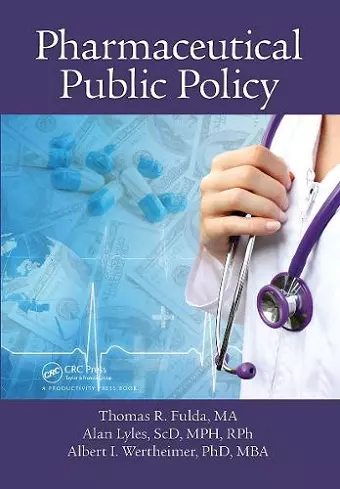Pharmaceutical Public Policy
Alan Lyles author Albert I Wertheimer author Thomas R Fulda author
Format:Paperback
Publisher:Taylor & Francis Ltd
Published:13th Dec '21
Currently unavailable, and unfortunately no date known when it will be back
This paperback is available in another edition too:
- Hardback£120.00(9781498748506)

As the most common health-care intervention, prescription drug use shares the most important characteristics of the health-care system in the United States. When everything works well, it makes possible breathtakingly successful applications of science to the prevention and cure of human suffering. But everything doesn’t always work well.
Pharmaceutical Public Policy provides the understanding and framework required for effective organization, financing, and delivery of pharmaceutical products and services. It supplies an overview of the policy process as well as the roles of legislation and regulation in pharmaceutical policy.
The book identifies the goals, objectives, and key policy issues of concern to stakeholders involved in the development of products, use of pharmaceuticals in healthcare, and administration of insurance programs by both the private and government sectors. Policy issues examined include the appropriateness of prescribing and patient adherence.
Addressing questions of access, quality, and cost, the book considers the operation of the Affordable Care Act and Medicare Part D. It details the responsibilities of Federal providers of pharmaceutical care and private and public payers such as managed care organizations, pharmacy benefit managers, Medicare, and Medicaid.
The book covers the policies and practices involved in promoting pharmaceutical products. It also considers pharmacoeconomics as a response to market failure. Finally, the book describes the market, the role of the manufacturer, drug shortages, and the responsibilities of the FDA.
The book includes a Foreword by Jerry Avorn, MD, Professor of Medicine, Harvard Medical School; and Chief, Division of Pharmacoepidemiology and Pharmacoeconomics, Brigham and Woman’s Hospital.
"Pharmaceutical policy has evolved over the last 50 years to be an enormously complex area of policy analysis. From the decisions that led to the exclusion of pharmaceutical coverage in Medicare at inception to the present, public and private sector policy makers have struggled to create and execute appropriate decisions on the optimal development, utilization and coverage of medications. This text is a must read resource for all health policy makers. While constituting only about 10 percent of total health spending in the US, the use of medications influences an enormous percentage of health spending. This includes the prevention and effective management of virtually all chronic conditions, hospital admissions and readmissions, and many other elements of health services. The editors have identified the leading experts across the entire landscape of pharmaceutical health policy and their contributions in the text will guide strong health policy development in this era of major change in health services design and -delivery."
—Lucinda L. Maine, PhD, RPh, Executive Vice President and CEO American Association of Colleges of Pharmacy
"Pharmaceutical Public Policy examines critical issues in health care from the public policy perspective, providing contemporary information, learned commentary, and fascinating reading. A typical chapter includes current tables and statistics, a review of federal government policy, and an international health care perspective. Those with an interest in the history of public policy will find facts, background, and insights especially valuable. The review of current topics coupled with future policy implications is useful to both students and scholars of pharmaceuticals in the marketplace."
—Peter D. Hurd, Ph.D. Professor and Department Chair, Pharmaceutical and Administrative Sciences St. Louis College of Pharmacy
"Marrying pharmaceutical public policy to population health begets offspring who can radically transform our broken system. Fulda, Lyles, and Wertheimer are the matchmakers who brought this unlikely couple together!"
—David B. Nash, MD, MBA, Dean, Jefferson School of Population Health
"Pharmaceutical Public Policy is a comprehensive resource for understanding public policies influencing access, pricing and prescribing of pharmaceuticals. It contains critical information on how medications are managed in the US healthcare system. I highly recommend it for health care providers and administrators, policy makers, legislators, businessmen, and others involved with pharmaceuticals. As many of the issues dealt with in this book reflect concerns of other countries, international audiences would also benefit from its comprehensive, integrated presentation."
—Marja Airaksinen, PhD, MSc(Pharm), Professor of Social Pharmacy, Faculty of Pharmacy, University of Helsinki
"Fulda; Lyles and Wertheimer’s Pharmaceutical Public Policy book investigates the myriad of facades of the health policy process, giving light to the numerous stakeholders and forces that come into play when developing such policies. In an era, where the government is pressed to find an equitable balance between access to care, quality of care and the cost of care, this book is a must read for anyone trying to navigate through these complexities. The authors did an incredible job giving a voice to all the controversial topics currently affecting the healthcare system going from specific issues such as medication adherence; good governance and health technology assessment to more general issues such as the dynamics of the pharmaceutical care industry; the affordable care act and the public health services amongst others. In a simple but yet sophisticated language the authors, gracefully succeeded in breaking down multidimensional subject matters into more accessible topics. This book provides for a tremendous read and reference for those interested in furthering their learning around pharmaceutical policies and more specifically the regulation of the medication use system debate in this country.
Overall, Pharmaceutical Public Policy is a fascinating book that delivers a remarkable unbiased perspective around the health care regulation forces at play and would provide for an excellent discussion springboard not only in a classroom setting but also amongst critical thinkers and avid "health policy-trend" readers. I highly recommend it."
—Batoul Senhaji-Tomza Pharm.D/ MPH, Professor, Touro College of Pharmacy, New York, New York, USA
ISBN: 9781032242514
Dimensions: unknown
Weight: 884g
514 pages